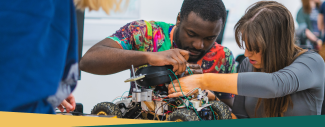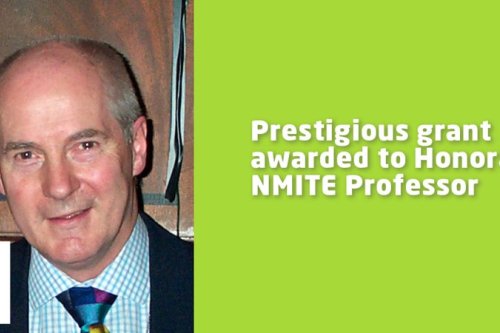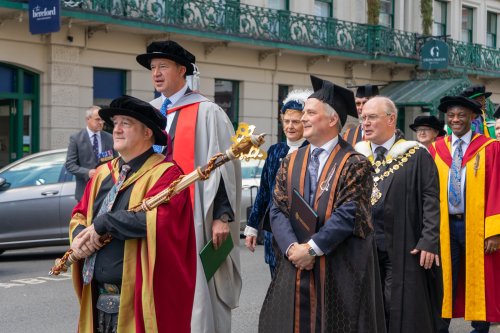As we mark National Engineering Day on November 13th, 2024, it's an opportunity to reflect on the incredible role engineers play in shaping our world and to celebrate the individuals who inspire the next generation of innovators. This year's theme highlights the importance of engineering role models, individuals who inspire others through their expertise, leadership, and commitment to solving real-world problems. At NMITE, we are fortunate to have educators who embody the characteristics of these role models every day.
In this post, we highlight several members of the NMITE faculty and their journeys to becoming educators and mentors, as well as the qualities that define an engineering role model.
Professor David Oloke – Chief Academic Officer: Leading with Experience
As an engineering consultant, lecturer, and manager of engineering degree programmes, Professor David Oloke has spent a lifetime in the engineering profession. He views NMITE as an innovative institution, providing an opportunity to mentor and inspire the next generation of engineers. “I found NMITE to be a leader in challenge-based learning,” he shares. “This is an opportunity to guide students through hands-on, real-world experiences that are shaping their professional future.”
David’s inspiration comes from his late father, an academic who embodied the qualities of a role model—passionate, knowledgeable, and approachable. This example continues to guide David in his work today, where he hopes to provide the same inspiration to his students.
Ben Shirley – Assistant Professor: A Passion for Sustainability
For Ben Shirley, the inspiration to pursue a career in engineering didn’t come from a single individual, but from a deep, lasting connection with the natural world. "It isn’t a question of 'who' but 'what'," says Ben. His love of nature drives his passion for teaching sustainable construction practices, particularly through the use of biogenic materials and modern methods of construction. This commitment to sustainability is something he shares with his students, hoping to inspire them to think about how engineering can contribute to preserving and restoring our environment.
Graham Ward – Associate Professor: Cultivating Problem-Solvers
Graham Ward’s path to becoming an educator was shaped by his extensive experience as an engineer. He believes that the Problem-Based Learning approach at NMITE equips students with the critical thinking and problem-solving skills they need to thrive in the workplace. “NMITE students have to work out for themselves what data they need and what to learn to solve a problem,” he explains. This approach, he believes, helps students become independent, capable engineers who can navigate complex real-world challenges.
Graham was also inspired by his cousin, who demonstrated the vast potential of human knowledge and the importance of lifelong learning. For Graham, this influence is something he now seeks to pass on to his own students, encouraging them to embrace the vast possibilities engineering offers.
Michael Smith – Associate Professor: Bridging Industry and Education
Michael Smith’s decision to become an educator stemmed from his industry experience. He has seen firsthand the skills and attributes that engineering graduates need, many of which are missing from traditional approaches to education. “I spent 4 months designing experiments for students to physically experience engineering principles,” Michael explains, adding that he enjoyed seeing the students learn in a practical, hands-on environment.
Michael, like many others, is inspired by the desire to make a tangible impact on the world, particularly by helping students bridge the gap between theoretical knowledge and practical application.
Dr Peter Broks – Associate Professor: The Power of Thought
Although not an engineer by training, Dr Peter Broks draws inspiration from a different source: the historian Jacob Bronowski. Bronowski’s BBC series “The Ascent of Man” sparked Peter’s fascination with the idea that history could be seen as the story of human thought. This interest led him to study the history of science, and ultimately to his role as an educator. But Peter also credits his father, a man who could repair and repurpose anything with his hands, for giving him a practical, can-do approach to problem-solving.
Peter’s story highlights an important point—engineering is about more than just technical expertise; it’s about creativity, critical thinking, and understanding the bigger picture.
Ian Chapman – Lead Learning Facilitator: A Lifetime of Experience
For Ian Chapman, becoming an educator was a natural extension of his varied career. Ian has done everything from building houses and making signs to repairing aeroplane parts. His diverse experiences have helped him get the best out of others and support them in achieving their potential. He credits his inspiration to the Honda advert, which asks the question, “What if?” Ian believes that asking "what if" is at the heart of innovation, an idea he encourages his students to embrace as they explore the possibilities engineering offers.
Tim Belden – Associate Professor: Learning by Doing
Tim Belden’s experience in industry shaped his approach to teaching. “Engineering is about learning to deal with the unknown, staying level-headed under pressure, and finding the best outcome possible, given all the constraints,” he says. At NMITE, students are given the opportunity to work on industry-level projects, delivering results for real-world partners while balancing factors like time, cost, and ethical considerations. This hands-on approach is what makes NMITE’s students exemplars of engineering role models.
Tim is motivated by the "light bulb moments" he sees in students when they make new connections and solve complex problems. It's these moments that remind him of the powerful impact educators can have on students’ lives.
Dr Parakram Pyakurel – Associate Professor: Understanding the Societal Impact of Engineering
Parakram Pyakurel believes that "Engineering does not happen in a vacuum and requires more than just technical skills. One of the important characteristics of an engineer is understanding the societal context and social impacts of engineering." He adds, "At NMITE, we embed liberal studies in engineering education, enabling students to understand the societal implications of engineering and the roles engineering plays in tackling global problems. By analysing how engineering projects interact with society, NMITE students exemplify an important characteristic of an engineering role model."
NMITE Students: The Future of Engineering Role Models
At NMITE, students aren’t just learning theory—they’re developing a broad range of skills that will help them become future engineering role models. From problem-solving and critical thinking to teamwork and communication, these students are preparing to tackle the world’s most pressing challenges.
As we celebrate National Engineering Day, it’s important to remember that role models come in many forms. The faculty members at NMITE, through their expertise, passion, and commitment to mentorship, are shaping the next generation of engineers who will make a positive impact on the world. Their dedication to sustainable practices, innovation, and hands-on learning ensures that future engineers will not only be technically skilled but also socially conscious and ready to lead.
So, let’s take a moment to appreciate the engineering role models in our lives—whether they’re educators, mentors, colleagues or family - and the incredible impact they have on shaping the engineers of tomorrow.







